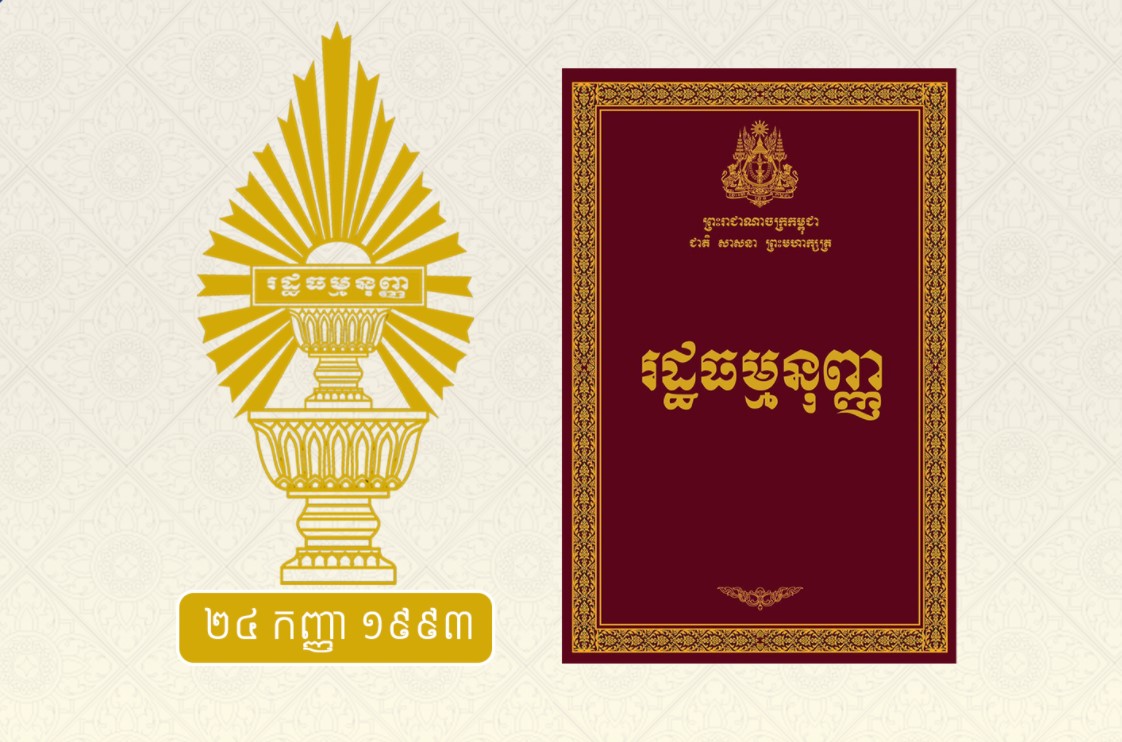
រដ្ឋធម្មនុញ្ញនៃព្រះរាជាណាចក្រកម្ពុជា ត្រូវបានប្រកាសអោយប្រើជាផ្លូវការដោយព្រះរាជក្រម ចុះថ្ងៃទី ២៤ ខែកញ្ញា ឆ្នាំ១៩៩៣។ រូបភាពត្រូវបានរចនាដោយអង្គការទិន្នន័យអំពីការអភិវឌ្ឍ (អូឌីស៊ី) ថ្ងៃទី១០ ខែកញ្ញា ឆ្នាំ២០២១។ ក្រោមអាជ្ញាបណ្ណ CC BY-SA 4.0។
រដ្ឋធម្មនុញ្ញនៃព្រះរាជាណាចក្រកម្ពុជាឆ្នាំ១៩៩៣ គឺជាច្បាប់កំពូលរបស់ប្រទេស។ រដ្ឋធម្មនុញ្ញត្រូវបានធ្វើឡើងដោយមានការគាំទ្រពីអង្គការសហប្រជាជាតិ និងសហគមន៍អន្តរជាតិដោយអនុលោមតាមកិច្ចព្រមព្រៀងទីក្រុងប៉ារីសឆ្នាំ១៩៩១ ហើយផ្អែកលើគោលការណ៍សម័យបច្ចុប្បន្នដូចជាប្រជាធិបតេយ្យ សិទ្ធិមនុស្សនិងនីតិរដ្ឋ និងការបែងចែកអំណាច ៖
- អំណាចនីតិបញ្ញត្តិ ៖ រដ្ឋសភា និងព្រឹទ្ធសភា
- អំណាចប្រតិបត្តិ៖ គណៈរដ្ឋមន្ត្រី - រាជរដ្ឋាភិបាលកម្ពុជា
- អំណាចតុលាការ៖ តុលាការកំពូល និងក្រុមប្រឹក្សាធម្មនុញ្ញ។
រដ្ឋធម្មនុញ្ញនេះក៏ឆ្លុះបញ្ចាំងពីលក្ខណៈប្រវត្តិសាស្ត្រ និងប្រពៃណីនៃព្រះរាជាណាចក្រផងដែរ គឺរាជានិយម សាសនារដ្ឋ និងស្ថាប័នរដ្ឋ។1 រដ្ឋធម្មនុញ្ញត្រូវបានធ្វើវិសោធនកម្មចំនួន ៨ដងក្នុងរយៈពេល២៦ឆ្នាំ គឺនៅក្នុងឆ្នាំ១៩៩៤2, ១៩៩៩, ២០០១, ២០០៥, ២០០៦, ២០០៨ , ២០១៤ និង២០១៨។3 4 នៅឆ្នាំ២០០៤ នីតិវិធីច្បាប់បន្ថែមត្រូវបានអនុម័ត បន្ទាប់ពីមានវិបត្តិរដ្ឋធម្មនុញ្ញក្រោយការបោះឆ្នោត។ ប្រការនេះអនុញ្ញាតឱ្យសមាជិករដ្ឋសភាចូលរួមក្នុងកិច្ចប្រជុំលើកដំបូងនៃអាណត្តិថ្មីដើម្បីកែប្រែរដ្ឋធម្មនុញ្ញដោយសម្លេងភាគច្រើនដាច់ខាតនៅពេលមានវិបត្តិនយោបាយ។5 រដ្ឋធម្មនុញ្ញនៃព្រះរាជាណាចក្រកម្ពុជាបច្ចុប្បន្នមាន១៧ជំពូក ៖
- ជំពូកទី ១ អំពីអធិបតេយ្យភាព
- ជំពូកទី ២ អំពីព្រះមហាក្សត្រ
- ជំពូកទី ៣ អំពីសិទ្ធិនិងករណីយកិច្ចរបស់ប្រជាពលរដ្ឋខ្មែរ
- ជំពូកទី ៤ អំពីរបបនយោបាយ
- ជំពូកទី ៥ អំពីសេដ្ឋកិច្ច
- ជំពូកទី ៦ អំពីអប់រំ វប្បធម៌ កិច្ចការសង្គម
- ជំពូកទី ៧ អំពីរដ្ឋសភា
- ជំពូកទី ៨ អំពីព្រឹទ្ធសភា
- ជំពូកទី ៩ អំពីសមាជរដ្ឋសភា និងព្រឹទ្ធសភា
- ជំពូកទី ១០ អំពីរាជរដ្ឋាភិបាល
- ជំពូកទី ១១ អំពីអំណាចតុលាការ
- ជំពូកទី ១២ អំពីក្រុមប្រឹក្សាធម្មនុញ្ញ
- ជំពូកទី ១៣ អំពីការគ្រប់គ្រងរដ្ឋបាល
- ជំពូកទី ១៤ អំពីសមាជជាតិ
- ជំពូកទី ១៥ អំពីអង្គការរៀបចំការបោះឆ្នោត
- ជំពូកទី ១៦ អំពីអនុភាព ការសើរើ និងវិសោធនកម្មរដ្ឋធម្មនុញ្ញ
- ជំពូកទី ១៧ អំពីអន្តរប្បញ្ញត្តិ។
សិទ្ធិជាមូលដ្ឋានរបស់ប្រជាពលរដ្ឋខ្មែរ
រដ្ឋធម្មនុញ្ញបានអះអាងទទួលស្គាល់និងគោរពសិទិ្ធជាមូលដ្ឋានរបស់មនុស្សទាំងអស់នៅក្នុងធម្មនុញ្ញអង្គការសហប្រជាជាតិ សេចក្តីប្រកាសជាសកលស្តីពីសិទ្ធិមនុស្ស និងអនុសញ្ញានានាដែលទាក់ទងនឹងសិទ្ធិមនុស្ស សិទ្ធិស្ត្រី សិទ្ធិកុមារ6 និងសំណុំនៃសិទ្ធិជាមូលដ្ឋានដែលត្រូវបានកំណត់ដោយរដ្ឋធម្មនុញ្ញ។7 ចាប់តាំងពីឆ្នាំ ២០០៣ មក រាជរដ្ឋាភិបាលកម្ពុជាបានធ្វើកំណែទម្រង់ប្រព័ន្ធតុលាការ និងច្បាប់ដើម្បីធានាប្រសិទ្ធភាពនៃនីតិរដ្ឋ និងការការពារសិទ្ធិមនុស្សដែលត្រូវបានការពារដោយរដ្ឋធម្មនុញ្ញ។ ដូច្នេះ រដ្ឋាភិបាលបានបង្កើតយុទ្ធសាស្ត្រកំណែទម្រង់ជាច្រើន ដែលថ្មីបំផុតគឺ ផែនការយុទ្ធសាស្ត្រអភិវឌ្ឍន៍ជាតិ ២០១៤-២០១៨ និងយុទ្ធសាស្ត្រចតុកោណដែលកំណត់សកម្មភាពអាទិភាពដែលត្រូវអនុវត្ត។ ទាំងនេះរួមមានការធ្វើទំនើបកម្មនៃក្របខ័ណ្ឌច្បាប់ ការផ្សព្វផ្សាយ និងការអនុវត្តច្បាប់ឱ្យកាន់តែប្រសើរ ការបែងចែកធនធានកាន់តែប្រសើរសម្រាប់ដំណើរការរបស់តុលាការ នគរបាល និងយន្តការដោះស្រាយវិវាទក្រៅប្រព័ន្ធតុលាការ។8 នៅឆ្នាំ ២០១៤ ច្បាប់ថ្មីសំខាន់ៗចំនួន៣ ត្រូវបានអនុម័ត គឺ ច្បាប់ស្តីពីការរៀបចំ និងការប្រព្រឹត្តទៅនៃឧត្តមក្រុមប្រឹក្សានៃអង្គចៅក្រម ច្បាប់ស្តីពីឋានៈចៅក្រម និងព្រះរាជអាជ្ញា និងច្បាប់ស្តីពីការរៀបចំនិងការប្រព្រឹត្តទៅនៃតុលាការ។ ដំណាក់កាលទី៤នៃផែនការយុទ្ធសាស្ត្រអភិវឌ្ឍន៍ជាតិដែលបានបោះពុម្ពផ្សាយនៅឆ្នាំ២០១៨ បន្តដោះស្រាយសកម្មភាពរបស់រដ្ឋាភិបាលក្នុងការស្វែងរកយុត្តិធម៌ដែលកាន់តែមានប្រសិទ្ធិភាព និងការធានាឱ្យកាន់តែប្រសើរឡើងនូវសិទ្ធិរបស់រដ្ឋធម្មនុញ្ញ។9
គេអាចរកឃើញសិទ្ធិទាំងនេះនៅក្នុងច្បាប់រដ្ឋធម្មនុញ្ញនៃព្រះរាជាណាចក្រកម្ពុជា រួមមាន៖10
- សិទ្ធិស្មើភាពគ្នាចំពោះមុខច្បាប់ និងសេរីភាពពីការរើសអើង
- សិទ្ធិរស់រានមានជីវិត សេរីភាព និងសន្តិសុខផ្ទាល់ខ្លួន និងសេរីភាពពីការដាក់ទោសប្រហាជីវិត
- សេរីភាពពីការដកហូតសញ្ជាតិ និងសេរីភាពពីការនិរទេសទៅឱ្យយប្រទេសក្រៅ
- សិទ្ធិបោះឆ្នោត និងឈរឈ្មោះអោយគេបោះឆ្នោត
- សិទ្ធិចូលរួមយ៉ាងសកម្មក្នុងជីវភាពនយោបាយ សេដ្ឋកិច្ច សង្គមកិច្ច និងវប្បធម៌របស់ប្រទេសជាតិ
- សិទ្ធិជ្រើសរើសមុខរបរ សិទ្ធិទទួលបានការធានារ៉ាប់រងសង្គម និងសិទ្ធិបង្កើតសហជីព
- សិទ្ធិធ្វើកូដកម្ម និងសិទ្ធិធ្វើបាតុកម្មដោយសន្តិវិធី
- សិទ្ធិការពារជីវិត កិត្តិយស សេចក្តីថ្លៃថ្នូរ សេរីភាពពីការធ្វើទារុណកម្ម សិទ្ធិទទួលបាននីតិវិធីដោះស្រាយត្រឹមត្រូវ សិទ្ធិក្នុងការការពារខ្លួន សិទ្ធិក្នុងការគ្មានទោសរហូតដល់មានការផ្តន្ទាទោសចុងក្រោយដោយតុលាការ
- សិទ្ធិក្នុងការប្តឹងតវ៉ា ឬប្តឹងទាមទារសំណងសម្រាប់ការខូចខាតដែលបណ្តាលមកពីអំពើខុសច្បាប់ដោយស្ថាប័ននានារបស់រដ្ឋសេរីភាពក្នុងការបម្លាស់ទី និងសិទ្ធិទទួលបានការរស់នៅឯកជន ការប្រាស្រ័យទាក់ទង និងការឆ្លើយឆ្លងគ្នាសេរីភាពក្នុងការបញ្ចេញមតិ សេរីភាពខាងសារព័ត៌មាន សេរីភាពខាងការប្រជុំ
- សិទ្ធិក្នុងការបង្កើតសមាគម និងគណបក្សនយោបាយ
- សិទ្ធិសេរីភាពសាសនា និងជំនឿ
- សិទ្ធិជាម្ចាស់កម្មសិទ្ធិ
- សិទ្ធិទទួលបានសមភាពរវាងបុរស និងស្ត្រី និងហាមឃាត់ការរើសអើងគ្រប់ប្រភេទប្រឆាំងនឺងស្ត្រីភេទ និងសិទ្ធិអាពាហ៍ពិពាហ៍
- សិទ្ធិលក់ផលិតផលរបស់ខ្លួនដោយសេរីសិទ្ធិទទួលបានសុខុមាលភាពសាធារណៈ និងសង្គមសម្រាប់លើកកម្ពស់កម្រិតជីវភាពរស់នៅ ការអប់រំ និងសុខភាព។
សិទ្ធិ និងសេរីភាពជាមូលដ្ឋានទាំងនេះមិនដាច់ខាតឡើយ ហើយត្រូវបានរឹតត្បិតដោយច្បាប់ផ្អែកលើសិទ្ធិរបស់អ្នកដទៃ សណ្តាប់ធ្នាប់សាធារណៈ សន្តិសុខជាតិ យុត្តិធម៌សង្គម សុខុមាលភាពសាធារណៈ និងសង្គម ព្រមទាំងសីលធម៌ និងទំនៀមទម្លាប់ល្អរបស់សង្គមខ្មែរ។11
កាតព្វកិច្ចជាមូលដ្ឋានរបស់ប្រជាពលរដ្ឋខ្មែរដែលកំណត់ដោយរដ្ឋធម្មនុញ្ញ
សម្រាប់បុគ្គលម្នាក់ៗ រដ្ឋធម្មនុញ្ញបានដាក់ចេញនូវភារកិច្ចចំនួនប្រាំ៖
- កាតព្វកិច្ចឪពុកម្តាយ និងកូនក្នុងការត្រូវចេះមើលថែគ្នាទៅវិញទៅមក12
- កាតព្វកិច្ចគោរពរដ្ឋធម្មនុញ្ញ និងច្បាប់13
- កាតព្វកិច្ចចូលរួមក្នុងការកសាងប្រទេសឡើងវិញ និងការពារមាតុភូមិ14
- កាតព្វកិច្ចគោរពគោលការណ៍អធិបតេយ្យភាពជាតិ និងលទ្ធិប្រជាធិបតេយ្យសេរីពហុបក្ស
- កាតព្វកិច្ចគោរពទ្រព្យសម្បត្តិសាធារណៈ និងការទទួលបានទ្រព្យសម្បត្តិឯកជនស្របច្បាប់។
- 15
សម្រាប់រដ្ឋ រដ្ឋធម្មនុញ្ញបានដាក់កាតព្វកិច្ច និងសិទ្ធិដើម្បី៖
- ការពារ និងលើកកម្ពស់ស្ត្រី កុមារ និងជនពិការ
- ការពារឯករាជ្យ អធិបតេយ្យភាព និងបូរណភាពទឹកដីរបស់ប្រទេសជាតិ
- ការពារឯកភាពជាតិ ការពារទំនៀមទម្លាប់ និងប្រពៃណីល្អរបស់ជាតិ
- ការពារភាពស្របច្បាប់ សណ្តាប់ធ្នាប់សាធារណៈ និងសន្តិសុខជាតិ
- លើកកម្ពស់សុខុមាលភាពសាធារណៈ និងសង្គម និងយុត្តិធម៌សង្គម
- ថែរក្សា និងការពារបរិស្ថានធម្មជាតិ
- ជំរុញការអភិវឌ្ឍសេដ្ឋកិច្ច
- ការពារតម្លៃ និងផលិតផលសម្រាប់កសិករនិងសិប្បករ និងរកទីផ្សារសម្រាប់ពួកគេ
- ការពារ និងលើកកម្ពស់គុណភាពអប់រំ អភិរក្ស ការពារ និងលើកកម្ពស់វប្បធម៌ជាតិ ភាសាខ្មែរ ប្រាសាទបុរាណនិងវត្ថុបុរាណ និងការពាររមណីយដ្ឋានប្រវត្តិសាស្ត្រ
- បង្កើតប្រព័ន្ធសន្តិសុខសង្គម។
ទាក់ទងនឹងរដ្ឋធម្មនុញ្ញ និងសិទ្ធិ
- អង្គនីតិប្រតិបត្តិ
- រដ្ឋសភា
- ប្រព័ន្ធរដ្ឋាភិបាល
- ច្បាប់ និងប្រព័ន្ធតុលាការ
- គោលដៅទី១៦ សន្តិភាព យុត្តិធម៌ និងស្ថាប័នរឹងមាំ
ឯកសារយោង
- 1. ហោ ប៉េង, គង់ ផល្លាក់, Jorg Menzel, “ការណែនាំអំពីច្បាប់កម្ពុជា,” Konrad-Adenauer-Stiftung, ២០១២, បានចូលអាននៅខែសីហា ឆ្នាំ២០១៩។
- 2. ហោ ប៉េង, គង់ ផល្លាក់, Jorg Menzel, “ច្បាប់រដ្ឋធម្មនុញ្ញកម្ពុជា,” Konrad-Adenauer-Stiftung, ២០១៦, បានចូលអាននៅខែសីហា ឆ្នាំ២០១៩។
- 3. ក្រុមប្រឹក្សាធម្មនុញ្ញនៃកម្ពុជា, “ប្រវត្តិរូប,”បានចូលអាននៅខែសីហា ឆ្នាំ២០១៩។
- 4. Anirudh Bhati, “ឃ្លាអមតៈសម្រាប់សណ្តាប់ធ្នាប់ប្រជាធិបតេយ្យសេរីនៅកម្ពុជា,”។
- 5. ហោ ប៉េង, គង់ ផល្លាក់, Jorg Menzel, “ការណែនាំអំពីច្បាប់កម្ពុជា,” Konrad-Adenauer-Stiftung, ២០១២, បានចូលអាននៅខែសីហា ឆ្នាំ២០១៩។
- 6. រាជរដ្ឋាភិបាលកម្ពុជា,“រដ្ឋធម្មនុញ្ញនៃព្រះរាជាណាចក្រកម្ពុជា,” មាត្រា ៣១ បានចូលអាននៅខែសីហា ឆ្នាំ ២០១៩
- 7. ហោ ប៉េង, គង់ ផល្លាក់, Jorg Menzel, “ច្បាប់រដ្ឋធម្មនុញ្ញកម្ពុជា,” Konrad-Adenauer-Stiftung, ២០១៦, បានចូលអាននៅខែសីហា ឆ្នាំ២០១៩។
- 8. វិទ្យាស្ថានសភាកម្ពុជា, “កំណែទម្រង់ច្បាប់និងប្រព័ន្ធយុត្តិធម៌នៅកម្ពុជា,” ខែកុម្ភៈឆ្នាំ ២០១៦, បានចូលអាននៅខែសីហា ឆ្នាំ ២០១៩។
- 9. រាជរដ្ឋាភិបាលកម្ពុជា, “យុទ្ធសាស្ត្រចតុកោណដំណាក់កាលទី ៤,” ខែកញ្ញា ឆ្នាំ ២០១៨ បានចូលអាននៅខែសីហា ឆ្នាំ ២០១៩។
- 10. រាជរដ្ឋាភិបាលកម្ពុជា,“រដ្ឋធម្មនុញ្ញនៃព្រះរាជាណាចក្រកម្ពុជា,” បានចូលអាននៅខែសីហាឆ្នាំ ២០១៩។
- 11. រាជរដ្ឋាភិបាលកម្ពុជា,“រដ្ឋធម្មនុញ្ញនៃព្រះរាជាណាចក្រកម្ពុជា,” មាត្រា ៤៦, ៤៨, ៥២-៥៧, បានចូលអាននៅខែសីហាឆ្នាំ ២០១៩។
- 12. រាជរដ្ឋាភិបាលកម្ពុជា, “រដ្ឋធម្មនុញ្ញនៃព្រះរាជាណាចក្រកម្ពុជា,”មាត្រា ៤៧, បានចូលអាននៅខែសីហាឆ្នាំ ២០១៩។
- 13. រាជរដ្ឋាភិបាលកម្ពុជា,“រដ្ឋធម្មនុញ្ញនៃព្រះរាជាណាចក្រកម្ពុជា,” មាត្រា ៤៩, បានចូលអាននៅខែសីហាឆ្នាំ ២០១៩
- 14. ដូចឯកសារយោងខាងដើម។
- 15. រាជរដ្ឋាភិបាលកម្ពុជា,“រដ្ឋធម្មនុញ្ញនៃព្រះរាជាណាចក្រកម្ពុជា,” មាត្រា ៥០, បានចូលអាននៅខែសីហាឆ្នាំ ២០១៩។

